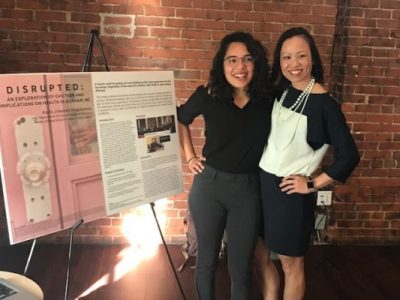Gillings student explores link between eviction and poor health in new website
May 15, 2019

Karla Jimenez-Magdaleno
“Disrupted: Eviction & Health in Durham, NC” is a website and exhibit that offers a glimpse into how eviction often leads to poor health outcomes. The project, which sheds light on this issue in Durham, North Carolina, is the work of Karla Jimenez-Magdaleno, a dual Master’s degree candidate in public health and city and regional planning at the University of North Carolina at Chapel Hill.
In Durham, where more than 9,000 evictions were filed between July 2017 and July 2018, many evictions are “no-fault,” meaning they were filed against tenants with no clear reason for eviction stated. With her public health background from the UNC Gillings School of Global Public Health, Jimenez-Magdaleno knew it is generally assumed that eviction negatively affects health, but little documentation exists about specific health impacts.
To learn more, she interviewed tenants receiving housing assistance in the form of Section 8 vouchers who had been given no-fault eviction notices. In the resulting website and exhibit, she shares stories and photos documenting the experiences of two women: One experienced aggravated symptoms of Lupus and scleroderma following eviction, and the other experienced high blood pressure, high cholesterol and depression. Read their stories at the Disrupted website.
“Disrupted was inspired by a health behavior project we did in the Planning Health Promotion class (HBEH 772) in spring 2018,” Jimenez-Magdaleno said. “That project focused on a three-pronged approach to reducing evictions in Durham County, N.C. I wanted to continue the project in some form without focusing on the ways we traditionally look at eviction — usually based in a belief that the tenant is at fault for not paying rent.”

Karla presents her work at a public exhibit in Durham. (Contibuted photo)
Jimenez-Magdaleno took a photojournalism approach to the investigation, and her website and exhibit are the culmination of findings that she says reveal systematic racism that has been occurring for years in Durham County and the rest of the state.
“We’re seeing very loose criteria for evicting families from their homes, with little to no protection for the tenants — who, overwhelmingly, are Black women throughout the South,” she said. “Despite the observation that these occurrences are emblematic of systemic issues in our socioeconomic institutions, the tenants who shared their stories with me consistently internalized their eviction as something shameful they had to withhold from their loved ones. This shame had an impact: It incited anxieties, depression and deterioration of their physical health. This was the case even if the tenants did everything right to respect the property they had lived in for years.”
In a follow-up story, The News & Observer covered Jimenez-Magdaleno’s work and discussed both pending affordable housing efforts in Durham and why 95 percent of Durham families facing a possible eviction currently do so without legal representation.
Contact the Gillings School of Global Public Health communications team at sphcomm@listserv.unc.edu.
